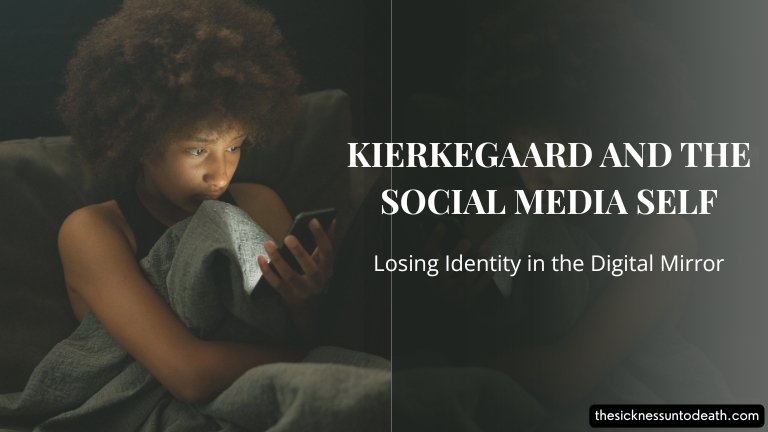Reflect on how Kierkegaard’s critique of “the crowd” can help us understand the struggle for authentic selfhood in a world of likes and filters.
We live in a world where identity is curated more than it is discovered. A world where the “self” is often shaped by selfies, captions, follower counts, and the need to be seen. It’s no exaggeration to say that for many of us, the line between who we are and who we present online has become worryingly blurred.
Long before Instagram, TikTok, or the pressure to keep up appearances on LinkedIn, Søren Kierkegaard warned about this very phenomenon. In his writings on “the crowd” and the danger of conforming to the masses, he laid bare the same struggle we face today: how to remain truly ourselves in a world constantly telling us who we should be.
The Age of Appearances
Scroll through any social feed and you’ll find it: the pressure to perform, to appear successful, happy, beautiful, and well-adjusted—even when reality tells another story. There’s an unspoken expectation to keep up the image, to stay relevant, to be liked.
But Kierkegaard saw this coming. In his critique of “the crowd,” he argued that individuals often lose themselves in the opinions, expectations, and values of others. When we prioritise what the crowd thinks over what is true for us, we become disconnected from our authentic selves.
“The crowd is untruth.”
That’s Kierkegaard’s bold claim. And in a world of digital crowds, it hits even harder.
The Social Media Self
On social media, identity becomes a performance. We edit, filter, and stage-manage our lives—not necessarily out of vanity, but because the system encourages it. Validation is visible. Approval is measurable. We are rewarded for conformity, and punished—subtly or not—for standing apart.
Kierkegaard warns us that this externalised way of living is spiritually dangerous. When we define ourselves by how we are perceived, we risk losing the inwardness—the soul—of who we are.
We become strangers to our own inner life. And eventually, we may forget who we were before the algorithm began shaping us.
Inwardness: The Antidote to the Digital Mirror
Kierkegaard’s remedy is what he calls inwardness—a turning away from the crowd and toward the self in relation to God. It’s not about selfishness or isolation. It’s about honesty. Integrity. Truthfulness before the One who sees us as we are, without filters.
In a world obsessed with outward appearance, this is a quiet rebellion.
“The thing is to understand myself, to see what God really wants me to do… to find a truth which is true for me.”
That kind of authenticity isn’t found in comment sections or curated feeds. It’s found in silence, in solitude, in self-reflection—and in spiritual grounding.
Escaping the Digital Disguise
This doesn’t mean deleting all social media accounts. Kierkegaard wouldn’t ask you to abandon the world—but to step back from its pressures and question what’s shaping you.
- Are you posting what’s true, or what you hope will be approved?
- Are you living a life that reflects your deepest values, or one that simply performs well online?
- When you’re alone—off-screen—do you still recognise yourself?
These questions aren’t meant to shame. They’re meant to invite. To lead you back to a self that isn’t swayed by the crowd, but anchored in something real.
Final Thoughts
In the mirror of social media, it’s easy to lose sight of who we truly are. Kierkegaard reminds us that identity isn’t something we manufacture—it’s something we discover through reflection, honesty, and spiritual depth.
You are more than your likes. More than your metrics. More than your online image.
And the journey back to your authentic self might begin not with a new post, but with a pause—a moment to turn inward, and ask the deeper question:
Who am I becoming?

